牛津译林版英语七年级下Unit 1 Dream Homes必考知识点归纳及练习(含答案)
文档属性
| 名称 | 牛津译林版英语七年级下Unit 1 Dream Homes必考知识点归纳及练习(含答案) | 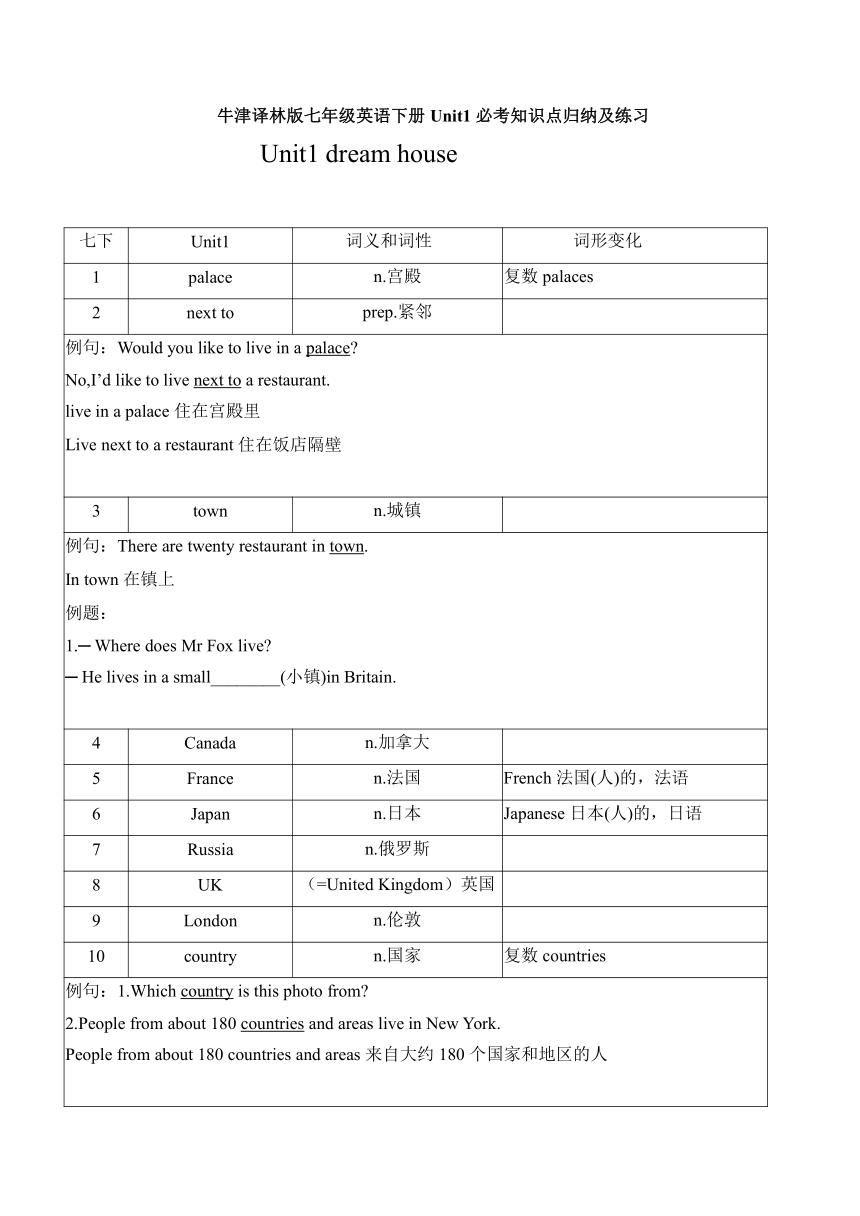 | |
| 格式 | doc | ||
| 文件大小 | 145.5KB | ||
| 资源类型 | 教案 | ||
| 版本资源 | 牛津译林版 | ||
| 科目 | 英语 | ||
| 更新时间 | 2021-05-27 21:39:57 | ||
图片预览

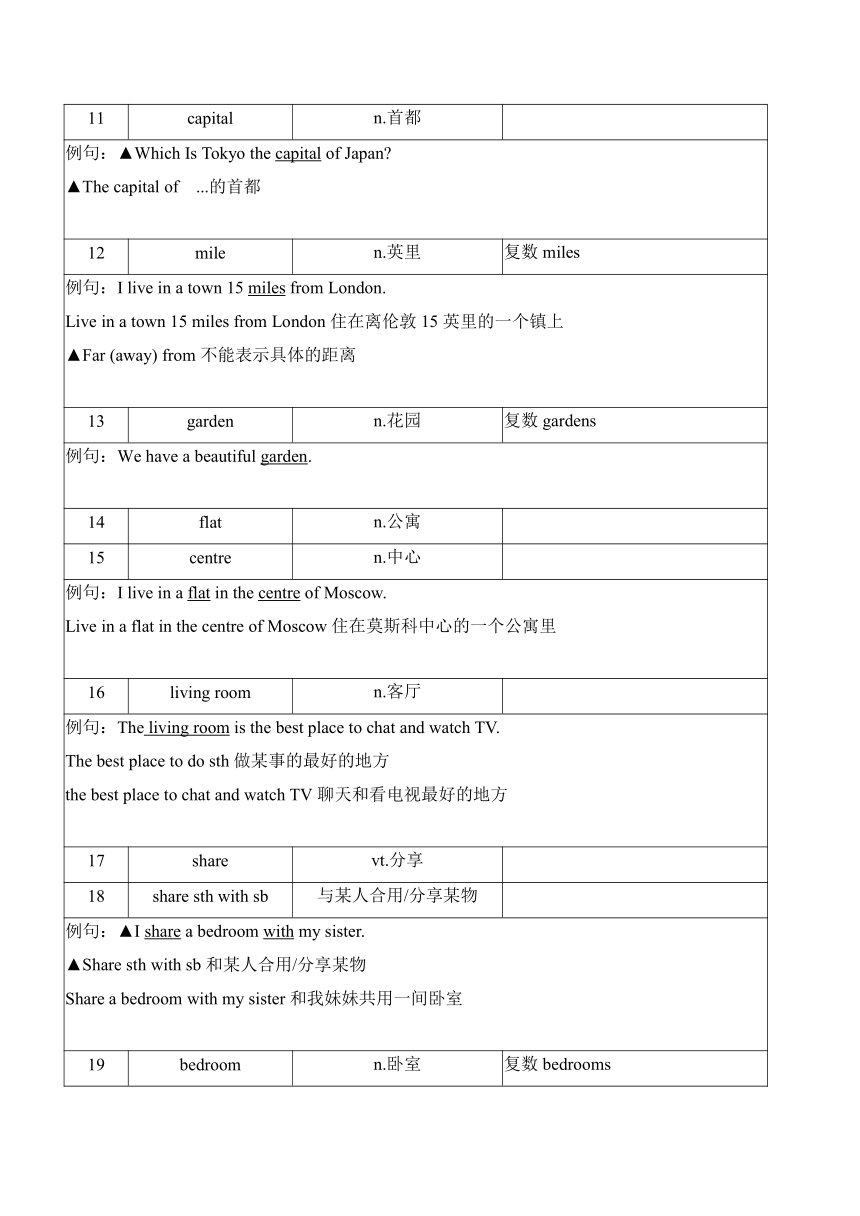
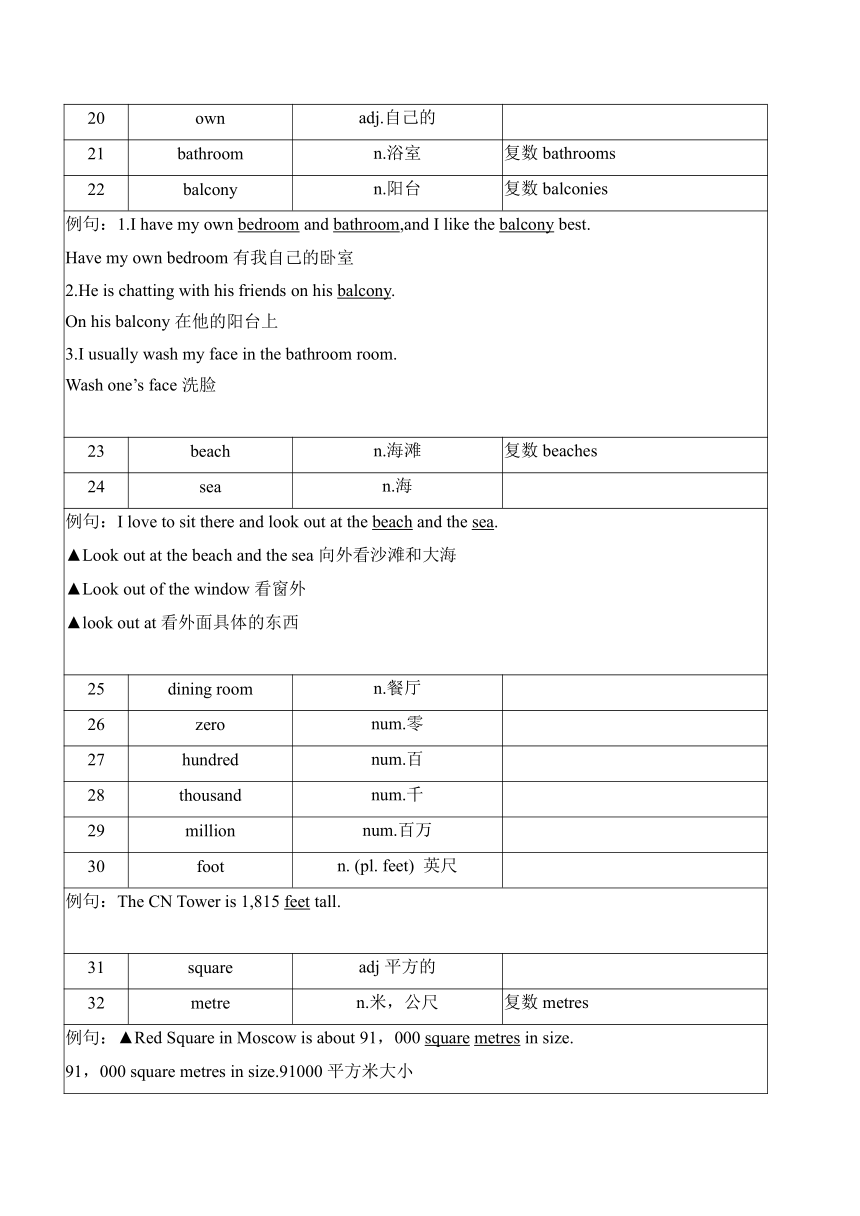
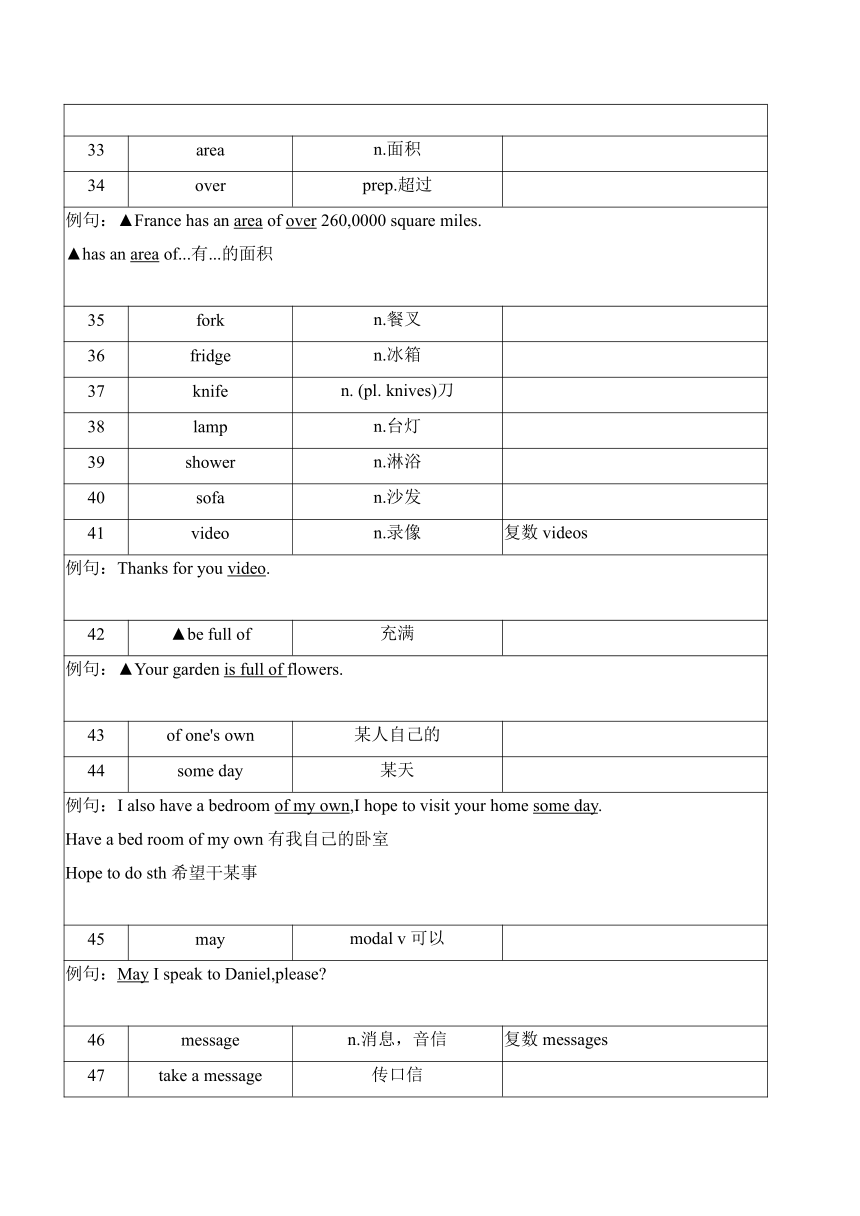
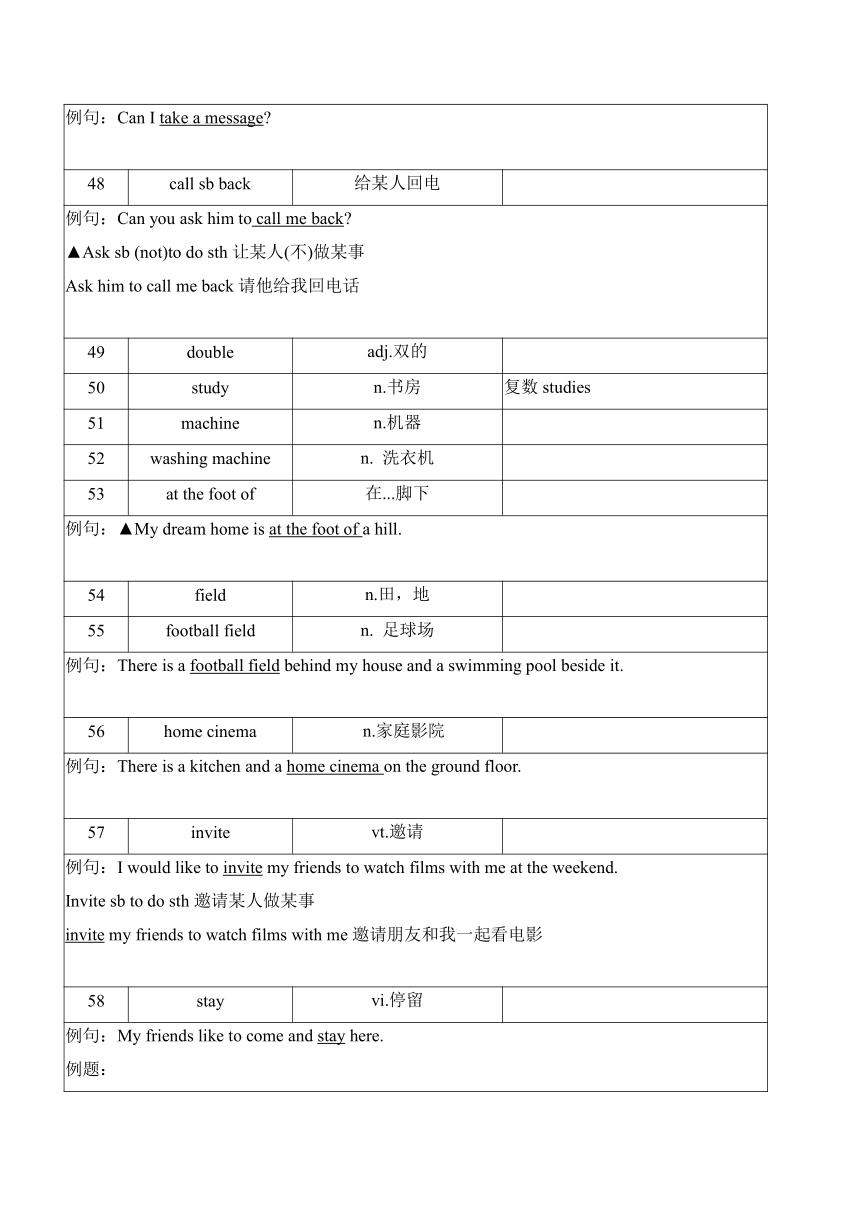
文档简介
牛津译林版七年级英语下册Unit1必考知识点归纳及练习
Unit1 dream house
七下 Unit1 词义和词性 词形变化
1 palace n.宫殿 复数palaces
2 next to prep.紧邻
例句:Would you like to live in a palace? No,I’d like to live next to a restaurant.
live in a palace住在宫殿里
Live next to a restaurant住在饭店隔壁
3 town n.城镇
例句:There are twenty restaurant in town. In town在镇上
例题:
1.─ Where does Mr Fox live?
─ He lives in a small________(小镇)in Britain.
4 Canada n.加拿大
5 France n.法国 French法国(人)的,法语
6 Japan n.日本 Japanese日本(人)的,日语
7 Russia n.俄罗斯
8 UK (=United Kingdom)英国
9 London n.伦敦
10 country n.国家 复数countries
例句:1.Which country is this photo from? 2.People from about 180 countries and areas live in New York.
People from about 180 countries and areas来自大约180个国家和地区的人
11 capital n.首都
例句:▲Which Is Tokyo the capital of Japan? ▲The capital of ...的首都
12 mile n.英里 复数miles
例句:I live in a town 15 miles from London. Live in a town 15 miles from London住在离伦敦15英里的一个镇上
▲Far (away) from不能表示具体的距离
13 garden n.花园 复数gardens
例句:We have a beautiful garden.
14 flat n.公寓
15 centre n.中心
例句:I live in a flat in the centre of Moscow. Live in a flat in the centre of Moscow住在莫斯科中心的一个公寓里
16 living room n.客厅
例句:The living room is the best place to chat and watch TV. The best place to do sth做某事的最好的地方
the best place to chat and watch TV聊天和看电视最好的地方
17 share vt.分享
18 share sth with sb 与某人合用/分享某物
例句:▲I share a bedroom with my sister. ▲Share sth with sb和某人合用/分享某物
Share a bedroom with my sister和我妹妹共用一间卧室
19 bedroom n.卧室 复数bedrooms
20 own adj.自己的
21 bathroom n.浴室 复数bathrooms
22 balcony n.阳台 复数balconies
例句:1.I have my own bedroom and bathroom,and I like the balcony best. Have my own bedroom有我自己的卧室
2.He is chatting with his friends on his balcony.
On his balcony在他的阳台上
3.I usually wash my face in the bathroom room.
Wash one’s face洗脸
23 beach n.海滩 复数beaches
24 sea n.海
例句:I love to sit there and look out at the beach and the sea. ▲Look out at the beach and the sea向外看沙滩和大海
▲Look out of the window看窗外
▲look out at看外面具体的东西
25 dining room n.餐厅
26 zero num.零
27 hundred num.百
28 thousand num.千
29 million num.百万
30 foot n. (pl. feet) 英尺
例句:The CN Tower is 1,815 feet tall.
31 square adj平方的
32 metre n.米,公尺 复数metres
例句:▲Red Square in Moscow is about 91,000 square metres in size. 91,000 square metres in size.91000平方米大小
33 area n.面积
34 over prep.超过
例句:▲France has an area of over 260,0000 square miles. ▲has an area of...有...的面积
35 fork n.餐叉
36 fridge n.冰箱
37 knife n. (pl. knives)刀
38 lamp n.台灯
39 shower n.淋浴
40 sofa n.沙发
41 video n.录像 复数videos
例句:Thanks for you video.
42 ▲be full of 充满
例句:▲Your garden is full of flowers.
43 of one's own 某人自己的
44 some day 某天
例句:I also have a bedroom of my own,I hope to visit your home some day. Have a bed room of my own有我自己的卧室
Hope to do sth希望干某事
45 may modal v可以
例句:May I speak to Daniel,please?
46 message n.消息,音信 复数messages
47 take a message 传口信
例句:Can I take a message?
48 call sb back 给某人回电
例句:Can you ask him to call me back? ▲Ask sb (not)to do sth让某人(不)做某事
Ask him to call me back请他给我回电话
49 double adj.双的
50 study n.书房 复数studies
51 machine n.机器
52 washing machine n. 洗衣机
53 at the foot of 在...脚下
例句:▲My dream home is at the foot of a hill.
54 field n.田,地
55 football field n. 足球场
例句:There is a football field behind my house and a swimming pool beside it.
56 home cinema n.家庭影院
例句:There is a kitchen and a home cinema on the ground floor.
57 invite vt.邀请
例句:I would like to invite my friends to watch films with me at the weekend. Invite sb to do sth邀请某人做某事
invite my friends to watch films with me邀请朋友和我一起看电影
58 stay vi.停留
例句:My friends like to come and stay here. 例题:
1.I had no plans to work. I just wanted to (停留) at home for some days.
【词汇精讲】 1. next to
(1)next to意为“紧邻,在……近旁”相当于介词beside或者短语close to,后接表示地点的名词或者代词。例如:
His room is next to mine. = His room is beside mine.
他的房间紧挨着我的房间。
(2)next to还可以意为“仅次于”。例如:
It is the largest city next to London. 这是仅次于伦敦的最大都市。
2. capital
(1)capital 名词,意为“首都,省会”。“the capital of …”意为“……的首都”。例如:
Beijing is the capital of China. 北京是中国的首都。
(2)capital 作名词还可以意为“省会,大写字母”。例如:
Zhengzhou is the capital of Henan Province. 郑州是河南省的省会。
3. centre
centre 名词,意为“中心”,“in the centre of …”意为“在……的中心”。例如:
The tower is in the centre of the town. 那座塔位于城镇的中心。
There is a big table in the centre of the room. 房子中央有一个大桌子。
【拓展】 centre 和 middle的辨析
(1)centre 指圆形,球形或市区等的中心。例如:
the centre of the circle 圆心
(2)middle 指长形物体的中间、道路的中间或者一段时间的中间。例如:
in the middle of the road 在路中间
in the middle of night 在午夜
4. share
share 动词,意为“合用,分享”。例如:
There aren’t enough books, so we have to share. 书不够,所以我们必须得合用。
They don’t want to share a taxi. 他们不想合乘一辆出租车。
share sth. with sb. 意为“与某人合用/分享某物”。例如:
I share a room with my elder sister. 我和姐姐共用一个房间。
5. own
(1)own形容词,意为“自己的”,常与形容词性物主代词连用。“one’s own…”意为“某人自己的……”。例如:
She has her own home. 她有自己的家。
(2)own还可以作动词,表示“拥有”,相当于have。例如:
I own a new flat. 我有一个新的公寓。
(3)owner 是own的名词形式,意为“主人,拥有者”。例如:
He is the owner of the car. 他是这辆小汽车的主人。
(4)own常用的搭配还有:
1)of one’s own 意为“属于某人自己的,自己独有的”。例如:
He has a room of his own. 他有属于他自己的房间。
2)on one’s own 意为“单独,独自”。例如:
You can’t expect him on his own. 你不能期望他独自一个人做那件事。
6. hundred
hundred是数词,意为“百”,当表示具体的“几百”时,用“基数词 + hundred”,注意不加-s。例如:
There are nine hundred students in our school. 我们学校有900名学生。
【拓展】
(1)hundreds of 表示“数百,成百上千的”,这时hundred后要加-s,且后面有介词of,但是不能与数词连用。例如:
There are hundreds of people in the restaurant. 在餐馆里有成百上千的人。
(2)表示数词的还有thousand“千”,million“百万”,billion“十亿”。它们的用法和hundred一样,可以用来表示约数和确数。
7. over
(1)over 为介词,有“超过,多于”的含义,相当于more than。
例如:There are over 50 students in our class, 在我们班里有50多名学生。
(2)over作介词还可以表示“在……上方”。
例如: There is a bridge over the river. 河上有座桥。
(3)over作副词, 表示“完了,结束”。常作表语。
例如:Class is over. 下课了。
(4)常见的over构成的短语有:
go over 检查 all over 遍及,整个 over and over 反复 over there 在那边
8. shower
(1)shower 名词,意为“阵雨,淋浴”;take a shower 意为“洗澡,洗淋浴”,等于have a shower。shower前面可以加形容词来修饰。例如:
I often take a shower in the evening. 我经常在晚上洗澡。
I take a cold shower when I feel tired. 我感到累时就洗个冷水澡。
(2)类似于“take a shower=have a shower”这样的用法还有:
take a look= have a look 看一看 take a seat = have a seat 坐下,入座
take a rest = have a rest 休息一下
9. be full of
be full of意为“充满”,相当于be filled with。例如:
The glass is full of water.=The glass is filled with water. 杯子里装满了水。
The classroom is full of different boys and girls. 教室里挤满了不同的男孩女孩。
10. take a message
message 名词,意为“消息,音信”。“take a message”意为“传个话,捎个口信”,“leave a message”意为“留言”。例如:
Can I take a message for you? 我能给你传个话吗?
Your friend left a message for you. 你的朋友给你留言了。
【拓展】辨析news与message
news是不可数名词,意为“消息,新闻”,指通过广播、电视及报纸报道的事。例如:
I like listening to news on the radio. 我喜欢听广播新闻。
message是可数名词,意为“口信,消息”,指通过口头或笔头传递给他人的消息。例如:
Sorry,he isn’t in. Could you leave a message?
对不起,他不在家,请你留个口信好吗?
11. field
(1)field 用作名词,意为“地,田“,复数形式为fields。例如:
a wheat field 麦田 work in the field 在田间工作
grow rice in the field 在田里种植水稻
(2)field 可以指某些必须具备特殊场地的球类运动,如:高尔夫球、足球、棒球以及垒球等的场地。例如:
football field 足球场 golf field 高尔夫球场 baseball field 棒球场
12. stay
(1)stay 作不及物动词,意为“停留,逗留”。例如:
Some students like to stay out after school. 放学后一些学生喜欢在外逗留。
stay 常见的搭配有:
stay at home 呆在家里 stay away from school/work 不上学/班
stay up 深夜不睡,熬夜
(2)stay 可以用来表示将某种情况保持在某种状态或者过程中,作此用法相当于连系动词,后面接形容词作表语。例如:
The shop stays open until ten at night. 这家商店营业到晚上10点钟。
(3)stay 作名词,意为“逗留,停留”。例如:
She enjoyed her stay with her sister. 她在她妹妹那儿过的很愉快。
I’d like to live next to a restaurant.
(1)“I’d like to”是“I would like to”的缩写,would意为“想”,是情态动词,常与like连用。在英语中“would like”是一个常用的结构,意为“想,愿意”,用来表示主语的意愿。“would like sth./to do sth.”意为“想要某物/做某事”,表示“想要做某事”时,可以和“sb. want to do sth. ”替换,但是“would you like...”的语气要更加的委婉。例如:He would like some fruit.他想要一些水果。
I’d like to have a rest.我想要休息一下。
I’d like to make friends with you. = I want to make friends with you.
我想要和你交朋友。
(2)?would like sb. to do sth.“想要某人做某事”。例如:
I’d like you to meet my parents.我想要你见见我父母。
? ? Would you like him to help your daughter with her English?
你想要他帮你女儿学英语吗?
(3)这样的句式变成一般疑问句时,把would提前,意为“想要做……吗?”;变成否定句时,在would的后面加not,意为“不想做……”。
例如:Would you like to show me your new camera?
你愿意把你的新照相机给我看看吗?
?? I wouldn’t like to go to the movies. 我不想去电影院。
2. I always have fun with my dog there.
fun为不可数名词,意为“娱乐,乐趣”,可用much;lots of;a lot of等修饰。have fun意为“玩得高兴,有趣”,相当于have a good time或enjoy oneself,其后接可接“doing sth.或with sth.”。例如:
We had fun talking and playing with him. 我们和他一起聊天,玩得很高兴。
He has fun with computer games. 他玩电脑游戏很开心。
【拓展】
fun的形容词为funny,意为“有趣的,可笑的”。
例如:He often tells me lots of funny stories.
他经常给我讲许多有趣的故事。
3. Can you ask him to call me back?
(1)ask sb. to do sth.“让某人做某事”,其否定形式为ask sb. not to do sth.“让某人不要做某事”。例如:
I often ask him to help me with my housework. 我经常让他帮助我做家务。
My mother asked me not to read in the sun. 妈妈让我不要在太阳下看书。
(2)ask sb. sth. “问某人某事”;“ask for sth.”意为“请求某事,要某物”,相当于“want sth.”。例如:
Can I ask you some questions? 我能问你一些问题吗?
Please ask for help if you have some problems. 如果你有问题,请寻求帮助。
ask sb. for sth.“向某人要某物”。例如:
If you don’t find the way to the school, please ask a policeman for help.
如果你找不到去学校的路,请找警察帮忙。
4. I would like to invite my friends to watch films with me at the weekend.
本句中的invite是及物动词,意为“邀请”,常用于下列结构:
(1)invite sb. 邀请某人 例如:
Do you invite the friends in Beijing? 你邀请北京的朋友了吗?
(2)invite sb. to some place邀请某人去某地 例如:
Why don’t you invite them to our school? 为什么不邀请他们来我们学校?
(3)invite sb. to (have) dinner邀请某人吃饭 例如:
Li Lin often invites me to (have) dinner. 李林经常邀请我吃饭。
(4)invite sb. to do sth. 邀请某人做某事 例如:
We invited our parents to come to our party. 我们邀请我们的父母来参加聚会。
【聚焦中考】:Unit1 必考知识点汇编 考点一:日常交际用语,would like的用法
—Would like to live in a palace, Eddie? 艾迪,你想要住在一个宫殿里吗?
—I’d like to live next to a restaurant. 我想住在饭店旁边。(教材第6页)
中考链接
—Would you like to go out to play basketball with me?
—_____, but I should finish my homework first.
A. It’s hard to say B. You’re welcome
C. I’d love to D. You’re right
【答案】C
【解析】本题考查日常交际用语。Would you like to do sth? 表示委婉地提出邀请,肯定回答常用Yes, I’d like / love to.;否定回答常用I’d like / love to, but...,故选C。
Would you like _______(park) your car here?
【答案】to park
【解析】would like后接名词,代词或动词不定式,答案为to park。
考点二:one的用法
The biggest one in the fifth street.
第五大街上最大的一家。(教材第6页)
中考链接
—Have you got any books on English grammar? I
want to borrow_____.
—Yes, here you are. But you must return it by Friday.
A. one B. it C. some D. that
【答案】A
【解析】本题考查词义辨析。one指同类事物中的“一个”,而it是指代前面提到的同一个人或事物。根据问句句意“你有一些关于英语语法方面的书吗?我想要借一本”可知,此处是指这些书中的任意一本,故选A。
2. (2015 ?四川宜宾中考)There are enough cups for each visitor to have _______.
A. one B. it C. this D. that
【答案】A
【解析】句意:有足够的杯子,每个访问者都有一个。one一;it它;this这;that那。one与it都可替代上文出现的某个名词,但用法不同。one用来指代上文出现的某类物中的一个,it指代上文中出现的那个物。所以选A。
考点三:数词的用法
Our flat is on the seventh floor.
我们的房间在7楼。(教材第12页)
中考链接
—How old is your daughter?
—_______. We had a special party for her_____ birthday yesterday.
A, Nine, nine B. Nine, ninth C. Ninth, ninth
【答案】B
【解析】本题考查数词的用法。表示“岁数”应用基数词,表示“某人的第几个生日”应用序数词,故选B。
—Can you tell me something about Thanksgiving Day?
—It comes on the ________(four) Thursday in the November in the USA.
【答案】fourth
考点四:名词所有格和介词的用法
Women’s Day is on the eighth of March.
妇女节在3月8日。(教材第12页)
中考链接
—Oh, Nancy! Do you live here?
—No. This house is_____. I am here to see his baby.
A .my son B. my son’s C. the baby D. the baby’s
【答案】B
【解析】本题考查名词所有格的用法。根据“这房子是我儿子的”可知,应用名词所有格形式,故选B。
—When is _____ Day?
—It’s on June 1st, Dave.
A. Child B. Children C. Child’s D. Children’s
【答案】D
【解析】本题考查名词所有格。六月一日是所有儿童的节日,所以儿童应用复数形式,故选D。
—Mr. Wu, when did the earthquake in Sichuan happened?
—_____ 8:02_____ the morning of April 20th, 2013.
A On, in B. At, on C. At, in D. On, on
【答案】B
【解析】本题考考查介词的用法。表示“在几点钟”介词应用at,表示“在具体某一天的上、下午或晚上,介词应用on,故选B。
考点五:打电话交际用语
May I speak to Daniel, please?
请问我可以和丹尼尔说话吗?(教材第14页)
(教材第12页)
中考链接
—May I speak to Robert?
—________.
A I’m Robert. B. Speaking, please
C. it’s 7384-5190 D. He is Robert.
【答案】B
【解析】本题考查打电话用语。在电话中表示“我是某某应用This is sb.(speaking).”,故选B。
考点六:how many的用法
How many people live in your home?
你的房间住了几个人?(教材第16页)
中考链接
—_____ apples do we need to make fruit salad?
—Let me think...We need three apples.
A How long B. How often C. How much D. How many
【答案】D
【解析】本题考查疑问词组的用法辨析。how long问的是多久,how often问的是频率,how much问的是多少钱或不可数名词的数量,how many问的是可数名词的复数形式。根据“我们需要三个苹果”可知,故选D。
▲词组背诵 in the centre of
在...中心
be full of...
满是...
some day
将来有一天,总有一天
the capital of the UK
英国首都
take a message (for sb)
为某人捎个口信
a town 15 miles from London
离伦敦15英里远的一个小镇
look out at
向外看
call sb back
回电话
share sth with sb
和某人分享/合用
invite sb.to do sth
邀请某人做某物某事
on the beach
在沙滩上
stay at home
待在家里
my own bedroom = a bedroom of my own
我自己的卧室
have an area of...
有...面积
on the balcony
在阳台上
next to a restaurant
饭店旁边
have fun
玩得开心
would like to do sth
想做某事
at the foot of
在...脚下
more than enough
足够多,太多
91,000 square metres in size
面积91,000平方米
on the ground floor
在一楼
be different from...
与...不同
Unit1 dream house
七下 Unit1 词义和词性 词形变化
1 palace n.宫殿 复数palaces
2 next to prep.紧邻
例句:Would you like to live in a palace? No,I’d like to live next to a restaurant.
live in a palace住在宫殿里
Live next to a restaurant住在饭店隔壁
3 town n.城镇
例句:There are twenty restaurant in town. In town在镇上
例题:
1.─ Where does Mr Fox live?
─ He lives in a small________(小镇)in Britain.
4 Canada n.加拿大
5 France n.法国 French法国(人)的,法语
6 Japan n.日本 Japanese日本(人)的,日语
7 Russia n.俄罗斯
8 UK (=United Kingdom)英国
9 London n.伦敦
10 country n.国家 复数countries
例句:1.Which country is this photo from? 2.People from about 180 countries and areas live in New York.
People from about 180 countries and areas来自大约180个国家和地区的人
11 capital n.首都
例句:▲Which Is Tokyo the capital of Japan? ▲The capital of ...的首都
12 mile n.英里 复数miles
例句:I live in a town 15 miles from London. Live in a town 15 miles from London住在离伦敦15英里的一个镇上
▲Far (away) from不能表示具体的距离
13 garden n.花园 复数gardens
例句:We have a beautiful garden.
14 flat n.公寓
15 centre n.中心
例句:I live in a flat in the centre of Moscow. Live in a flat in the centre of Moscow住在莫斯科中心的一个公寓里
16 living room n.客厅
例句:The living room is the best place to chat and watch TV. The best place to do sth做某事的最好的地方
the best place to chat and watch TV聊天和看电视最好的地方
17 share vt.分享
18 share sth with sb 与某人合用/分享某物
例句:▲I share a bedroom with my sister. ▲Share sth with sb和某人合用/分享某物
Share a bedroom with my sister和我妹妹共用一间卧室
19 bedroom n.卧室 复数bedrooms
20 own adj.自己的
21 bathroom n.浴室 复数bathrooms
22 balcony n.阳台 复数balconies
例句:1.I have my own bedroom and bathroom,and I like the balcony best. Have my own bedroom有我自己的卧室
2.He is chatting with his friends on his balcony.
On his balcony在他的阳台上
3.I usually wash my face in the bathroom room.
Wash one’s face洗脸
23 beach n.海滩 复数beaches
24 sea n.海
例句:I love to sit there and look out at the beach and the sea. ▲Look out at the beach and the sea向外看沙滩和大海
▲Look out of the window看窗外
▲look out at看外面具体的东西
25 dining room n.餐厅
26 zero num.零
27 hundred num.百
28 thousand num.千
29 million num.百万
30 foot n. (pl. feet) 英尺
例句:The CN Tower is 1,815 feet tall.
31 square adj平方的
32 metre n.米,公尺 复数metres
例句:▲Red Square in Moscow is about 91,000 square metres in size. 91,000 square metres in size.91000平方米大小
33 area n.面积
34 over prep.超过
例句:▲France has an area of over 260,0000 square miles. ▲has an area of...有...的面积
35 fork n.餐叉
36 fridge n.冰箱
37 knife n. (pl. knives)刀
38 lamp n.台灯
39 shower n.淋浴
40 sofa n.沙发
41 video n.录像 复数videos
例句:Thanks for you video.
42 ▲be full of 充满
例句:▲Your garden is full of flowers.
43 of one's own 某人自己的
44 some day 某天
例句:I also have a bedroom of my own,I hope to visit your home some day. Have a bed room of my own有我自己的卧室
Hope to do sth希望干某事
45 may modal v可以
例句:May I speak to Daniel,please?
46 message n.消息,音信 复数messages
47 take a message 传口信
例句:Can I take a message?
48 call sb back 给某人回电
例句:Can you ask him to call me back? ▲Ask sb (not)to do sth让某人(不)做某事
Ask him to call me back请他给我回电话
49 double adj.双的
50 study n.书房 复数studies
51 machine n.机器
52 washing machine n. 洗衣机
53 at the foot of 在...脚下
例句:▲My dream home is at the foot of a hill.
54 field n.田,地
55 football field n. 足球场
例句:There is a football field behind my house and a swimming pool beside it.
56 home cinema n.家庭影院
例句:There is a kitchen and a home cinema on the ground floor.
57 invite vt.邀请
例句:I would like to invite my friends to watch films with me at the weekend. Invite sb to do sth邀请某人做某事
invite my friends to watch films with me邀请朋友和我一起看电影
58 stay vi.停留
例句:My friends like to come and stay here. 例题:
1.I had no plans to work. I just wanted to (停留) at home for some days.
【词汇精讲】 1. next to
(1)next to意为“紧邻,在……近旁”相当于介词beside或者短语close to,后接表示地点的名词或者代词。例如:
His room is next to mine. = His room is beside mine.
他的房间紧挨着我的房间。
(2)next to还可以意为“仅次于”。例如:
It is the largest city next to London. 这是仅次于伦敦的最大都市。
2. capital
(1)capital 名词,意为“首都,省会”。“the capital of …”意为“……的首都”。例如:
Beijing is the capital of China. 北京是中国的首都。
(2)capital 作名词还可以意为“省会,大写字母”。例如:
Zhengzhou is the capital of Henan Province. 郑州是河南省的省会。
3. centre
centre 名词,意为“中心”,“in the centre of …”意为“在……的中心”。例如:
The tower is in the centre of the town. 那座塔位于城镇的中心。
There is a big table in the centre of the room. 房子中央有一个大桌子。
【拓展】 centre 和 middle的辨析
(1)centre 指圆形,球形或市区等的中心。例如:
the centre of the circle 圆心
(2)middle 指长形物体的中间、道路的中间或者一段时间的中间。例如:
in the middle of the road 在路中间
in the middle of night 在午夜
4. share
share 动词,意为“合用,分享”。例如:
There aren’t enough books, so we have to share. 书不够,所以我们必须得合用。
They don’t want to share a taxi. 他们不想合乘一辆出租车。
share sth. with sb. 意为“与某人合用/分享某物”。例如:
I share a room with my elder sister. 我和姐姐共用一个房间。
5. own
(1)own形容词,意为“自己的”,常与形容词性物主代词连用。“one’s own…”意为“某人自己的……”。例如:
She has her own home. 她有自己的家。
(2)own还可以作动词,表示“拥有”,相当于have。例如:
I own a new flat. 我有一个新的公寓。
(3)owner 是own的名词形式,意为“主人,拥有者”。例如:
He is the owner of the car. 他是这辆小汽车的主人。
(4)own常用的搭配还有:
1)of one’s own 意为“属于某人自己的,自己独有的”。例如:
He has a room of his own. 他有属于他自己的房间。
2)on one’s own 意为“单独,独自”。例如:
You can’t expect him on his own. 你不能期望他独自一个人做那件事。
6. hundred
hundred是数词,意为“百”,当表示具体的“几百”时,用“基数词 + hundred”,注意不加-s。例如:
There are nine hundred students in our school. 我们学校有900名学生。
【拓展】
(1)hundreds of 表示“数百,成百上千的”,这时hundred后要加-s,且后面有介词of,但是不能与数词连用。例如:
There are hundreds of people in the restaurant. 在餐馆里有成百上千的人。
(2)表示数词的还有thousand“千”,million“百万”,billion“十亿”。它们的用法和hundred一样,可以用来表示约数和确数。
7. over
(1)over 为介词,有“超过,多于”的含义,相当于more than。
例如:There are over 50 students in our class, 在我们班里有50多名学生。
(2)over作介词还可以表示“在……上方”。
例如: There is a bridge over the river. 河上有座桥。
(3)over作副词, 表示“完了,结束”。常作表语。
例如:Class is over. 下课了。
(4)常见的over构成的短语有:
go over 检查 all over 遍及,整个 over and over 反复 over there 在那边
8. shower
(1)shower 名词,意为“阵雨,淋浴”;take a shower 意为“洗澡,洗淋浴”,等于have a shower。shower前面可以加形容词来修饰。例如:
I often take a shower in the evening. 我经常在晚上洗澡。
I take a cold shower when I feel tired. 我感到累时就洗个冷水澡。
(2)类似于“take a shower=have a shower”这样的用法还有:
take a look= have a look 看一看 take a seat = have a seat 坐下,入座
take a rest = have a rest 休息一下
9. be full of
be full of意为“充满”,相当于be filled with。例如:
The glass is full of water.=The glass is filled with water. 杯子里装满了水。
The classroom is full of different boys and girls. 教室里挤满了不同的男孩女孩。
10. take a message
message 名词,意为“消息,音信”。“take a message”意为“传个话,捎个口信”,“leave a message”意为“留言”。例如:
Can I take a message for you? 我能给你传个话吗?
Your friend left a message for you. 你的朋友给你留言了。
【拓展】辨析news与message
news是不可数名词,意为“消息,新闻”,指通过广播、电视及报纸报道的事。例如:
I like listening to news on the radio. 我喜欢听广播新闻。
message是可数名词,意为“口信,消息”,指通过口头或笔头传递给他人的消息。例如:
Sorry,he isn’t in. Could you leave a message?
对不起,他不在家,请你留个口信好吗?
11. field
(1)field 用作名词,意为“地,田“,复数形式为fields。例如:
a wheat field 麦田 work in the field 在田间工作
grow rice in the field 在田里种植水稻
(2)field 可以指某些必须具备特殊场地的球类运动,如:高尔夫球、足球、棒球以及垒球等的场地。例如:
football field 足球场 golf field 高尔夫球场 baseball field 棒球场
12. stay
(1)stay 作不及物动词,意为“停留,逗留”。例如:
Some students like to stay out after school. 放学后一些学生喜欢在外逗留。
stay 常见的搭配有:
stay at home 呆在家里 stay away from school/work 不上学/班
stay up 深夜不睡,熬夜
(2)stay 可以用来表示将某种情况保持在某种状态或者过程中,作此用法相当于连系动词,后面接形容词作表语。例如:
The shop stays open until ten at night. 这家商店营业到晚上10点钟。
(3)stay 作名词,意为“逗留,停留”。例如:
She enjoyed her stay with her sister. 她在她妹妹那儿过的很愉快。
I’d like to live next to a restaurant.
(1)“I’d like to”是“I would like to”的缩写,would意为“想”,是情态动词,常与like连用。在英语中“would like”是一个常用的结构,意为“想,愿意”,用来表示主语的意愿。“would like sth./to do sth.”意为“想要某物/做某事”,表示“想要做某事”时,可以和“sb. want to do sth. ”替换,但是“would you like...”的语气要更加的委婉。例如:He would like some fruit.他想要一些水果。
I’d like to have a rest.我想要休息一下。
I’d like to make friends with you. = I want to make friends with you.
我想要和你交朋友。
(2)?would like sb. to do sth.“想要某人做某事”。例如:
I’d like you to meet my parents.我想要你见见我父母。
? ? Would you like him to help your daughter with her English?
你想要他帮你女儿学英语吗?
(3)这样的句式变成一般疑问句时,把would提前,意为“想要做……吗?”;变成否定句时,在would的后面加not,意为“不想做……”。
例如:Would you like to show me your new camera?
你愿意把你的新照相机给我看看吗?
?? I wouldn’t like to go to the movies. 我不想去电影院。
2. I always have fun with my dog there.
fun为不可数名词,意为“娱乐,乐趣”,可用much;lots of;a lot of等修饰。have fun意为“玩得高兴,有趣”,相当于have a good time或enjoy oneself,其后接可接“doing sth.或with sth.”。例如:
We had fun talking and playing with him. 我们和他一起聊天,玩得很高兴。
He has fun with computer games. 他玩电脑游戏很开心。
【拓展】
fun的形容词为funny,意为“有趣的,可笑的”。
例如:He often tells me lots of funny stories.
他经常给我讲许多有趣的故事。
3. Can you ask him to call me back?
(1)ask sb. to do sth.“让某人做某事”,其否定形式为ask sb. not to do sth.“让某人不要做某事”。例如:
I often ask him to help me with my housework. 我经常让他帮助我做家务。
My mother asked me not to read in the sun. 妈妈让我不要在太阳下看书。
(2)ask sb. sth. “问某人某事”;“ask for sth.”意为“请求某事,要某物”,相当于“want sth.”。例如:
Can I ask you some questions? 我能问你一些问题吗?
Please ask for help if you have some problems. 如果你有问题,请寻求帮助。
ask sb. for sth.“向某人要某物”。例如:
If you don’t find the way to the school, please ask a policeman for help.
如果你找不到去学校的路,请找警察帮忙。
4. I would like to invite my friends to watch films with me at the weekend.
本句中的invite是及物动词,意为“邀请”,常用于下列结构:
(1)invite sb. 邀请某人 例如:
Do you invite the friends in Beijing? 你邀请北京的朋友了吗?
(2)invite sb. to some place邀请某人去某地 例如:
Why don’t you invite them to our school? 为什么不邀请他们来我们学校?
(3)invite sb. to (have) dinner邀请某人吃饭 例如:
Li Lin often invites me to (have) dinner. 李林经常邀请我吃饭。
(4)invite sb. to do sth. 邀请某人做某事 例如:
We invited our parents to come to our party. 我们邀请我们的父母来参加聚会。
【聚焦中考】:Unit1 必考知识点汇编 考点一:日常交际用语,would like的用法
—Would like to live in a palace, Eddie? 艾迪,你想要住在一个宫殿里吗?
—I’d like to live next to a restaurant. 我想住在饭店旁边。(教材第6页)
中考链接
—Would you like to go out to play basketball with me?
—_____, but I should finish my homework first.
A. It’s hard to say B. You’re welcome
C. I’d love to D. You’re right
【答案】C
【解析】本题考查日常交际用语。Would you like to do sth? 表示委婉地提出邀请,肯定回答常用Yes, I’d like / love to.;否定回答常用I’d like / love to, but...,故选C。
Would you like _______(park) your car here?
【答案】to park
【解析】would like后接名词,代词或动词不定式,答案为to park。
考点二:one的用法
The biggest one in the fifth street.
第五大街上最大的一家。(教材第6页)
中考链接
—Have you got any books on English grammar? I
want to borrow_____.
—Yes, here you are. But you must return it by Friday.
A. one B. it C. some D. that
【答案】A
【解析】本题考查词义辨析。one指同类事物中的“一个”,而it是指代前面提到的同一个人或事物。根据问句句意“你有一些关于英语语法方面的书吗?我想要借一本”可知,此处是指这些书中的任意一本,故选A。
2. (2015 ?四川宜宾中考)There are enough cups for each visitor to have _______.
A. one B. it C. this D. that
【答案】A
【解析】句意:有足够的杯子,每个访问者都有一个。one一;it它;this这;that那。one与it都可替代上文出现的某个名词,但用法不同。one用来指代上文出现的某类物中的一个,it指代上文中出现的那个物。所以选A。
考点三:数词的用法
Our flat is on the seventh floor.
我们的房间在7楼。(教材第12页)
中考链接
—How old is your daughter?
—_______. We had a special party for her_____ birthday yesterday.
A, Nine, nine B. Nine, ninth C. Ninth, ninth
【答案】B
【解析】本题考查数词的用法。表示“岁数”应用基数词,表示“某人的第几个生日”应用序数词,故选B。
—Can you tell me something about Thanksgiving Day?
—It comes on the ________(four) Thursday in the November in the USA.
【答案】fourth
考点四:名词所有格和介词的用法
Women’s Day is on the eighth of March.
妇女节在3月8日。(教材第12页)
中考链接
—Oh, Nancy! Do you live here?
—No. This house is_____. I am here to see his baby.
A .my son B. my son’s C. the baby D. the baby’s
【答案】B
【解析】本题考查名词所有格的用法。根据“这房子是我儿子的”可知,应用名词所有格形式,故选B。
—When is _____ Day?
—It’s on June 1st, Dave.
A. Child B. Children C. Child’s D. Children’s
【答案】D
【解析】本题考查名词所有格。六月一日是所有儿童的节日,所以儿童应用复数形式,故选D。
—Mr. Wu, when did the earthquake in Sichuan happened?
—_____ 8:02_____ the morning of April 20th, 2013.
A On, in B. At, on C. At, in D. On, on
【答案】B
【解析】本题考考查介词的用法。表示“在几点钟”介词应用at,表示“在具体某一天的上、下午或晚上,介词应用on,故选B。
考点五:打电话交际用语
May I speak to Daniel, please?
请问我可以和丹尼尔说话吗?(教材第14页)
(教材第12页)
中考链接
—May I speak to Robert?
—________.
A I’m Robert. B. Speaking, please
C. it’s 7384-5190 D. He is Robert.
【答案】B
【解析】本题考查打电话用语。在电话中表示“我是某某应用This is sb.(speaking).”,故选B。
考点六:how many的用法
How many people live in your home?
你的房间住了几个人?(教材第16页)
中考链接
—_____ apples do we need to make fruit salad?
—Let me think...We need three apples.
A How long B. How often C. How much D. How many
【答案】D
【解析】本题考查疑问词组的用法辨析。how long问的是多久,how often问的是频率,how much问的是多少钱或不可数名词的数量,how many问的是可数名词的复数形式。根据“我们需要三个苹果”可知,故选D。
▲词组背诵 in the centre of
在...中心
be full of...
满是...
some day
将来有一天,总有一天
the capital of the UK
英国首都
take a message (for sb)
为某人捎个口信
a town 15 miles from London
离伦敦15英里远的一个小镇
look out at
向外看
call sb back
回电话
share sth with sb
和某人分享/合用
invite sb.to do sth
邀请某人做某物某事
on the beach
在沙滩上
stay at home
待在家里
my own bedroom = a bedroom of my own
我自己的卧室
have an area of...
有...面积
on the balcony
在阳台上
next to a restaurant
饭店旁边
have fun
玩得开心
would like to do sth
想做某事
at the foot of
在...脚下
more than enough
足够多,太多
91,000 square metres in size
面积91,000平方米
on the ground floor
在一楼
be different from...
与...不同
